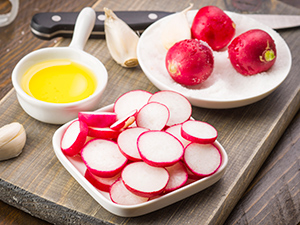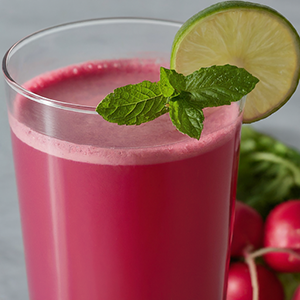Contents
The Romans knew the health benefits of radishes for centuries, and while they spread radishes throughout Europe, they are far more appreciated in the Far East. While the Germans eat an average of 250 grams of radishes per person per year, the Japanese eat up to thirteen kilos, and in Korea, it may be as much as thirty.

Radish Scientific Facts
- Scientific name – Raphanus sativus L.
- Related species – Horseradish (Armoracia rusticana).
- Other names – Clover radish.
- French – Radius cultivé
- Spanish – Rábano, rabanete, nabón
- German – Rettich.
- Description—This is the root of the radish plant, an herbaceous plant of the botanical family Cruciferae that may reach one meter in height. The root can be spherical, conical, or cylindrical. Radishes are usually bright red, but there are also black and white radishes.
- Environment – Originally from the Near East, they spread throughout Europe during Roman times. Today, they are grown in all temperate regions, mainly China, Japan, and Korea.
Health Benefits of Radishes

The radish is almost 95 percent water. It contains very little protein (0.6 percent) and fat (0.54 percent), and its percentage of carbohydrates is also low (1.99 percent). It is also poor in provitamin A and B group vitamins, except folates (27 mg/100 grams). It does not provide vitamin E. Vitamin C is the most abundant (22.8 mg/100 grams). Minerals are present in lesser amounts, except potassium. From a nutritional point of view, they are of little value: they provide only 17 kcal/100 grams).
All varieties of radish contain sulfurated essence that gives them a sharp, piquant taste and is attributed to choleretic (increases bile production), cholagogic (facilitates gallbladder drainage), digestive, antibiotic, and mucolytic (softening mucus) properties. Their applications are as follows:
LIVER and GALLBLADDER DISORDERS
FUNCTIONAL DIGESTIVE DISORDERS (slow or difficult digestion) because of their aperitif and tonic effects.

SINUSITIS, and BRONCHITIS.
CANCER PREVENTION – The Chinese radish, possibly the common radish, impedes cellular mutations leading to cancer.
Horseradish helps stimulate stomach secretions. Its syrup is an excellent remedy for sinus congestion and aids digestion. The plant is suitable for urine retention and dropsy and is beneficial for the pancreas. It can treat worm infestation, sciatica, hoarseness, arthritis, asthma, coughs, and colds.
Horseradish root has external applications, including treating swelling of the spleen and liver. The Germans also use it to treat urinary infections and respiratory tract inflammation.
WARNING: Avoid contact with your eyes. Do not leave it on your skin, as it can cause blistering.
How to Use and Prepare Radishes
- RAW – This is typically how radishes are eaten. Red radishes add a vivid note to salads. Their piquant flavor is an aperitif and digestive.
- CANNED – In some far eastern countries, radishes are preserved in vinegar or fermented in various other substances. These methods significantly reduce their vitamin content and medicinal properties.
- Decoction: Simmer for five to fifteen minutes, then take six ounces one to two times daily, cold or warm, and two to three tablespoons three times daily.
DISCLAIMER: All content on this website is presented solely for educational and informational objectives. Do not rely on the information provided as a replacement for advice, diagnosis, or treatment from a qualified medical expert. If you are pregnant, nursing, or have any preexisting medical concerns, talk to your doctor before using any herbal or natural medicines.
REFERENCES
- George D. Pamplona-Roger, M.D. “Encyclopedia of Foods and Their Healing Power.” George D. Pamplona-Roger, M.D. Encyclopedia of Foods and Their Healing Power. Trans. Annette Melgosa. Vol. 2. Chai Wan: Editorial Safeliz, 2005. 181. Print.[health benefits of radishes]
- Vance Ferrell Harold M. Cherne, M.D. The Natural Remedies Encyclopedia [Book]. – Altamont, TN: Harvestime Books, 2010. – Vol. Seventh Edition: 7: pp. 163.
- WebMD: https://www.webmd.com/diet/health-benefits-radish
- Healthline: https://www.healthline.com/health/food-nutrition/the-benefits-of-radishes
